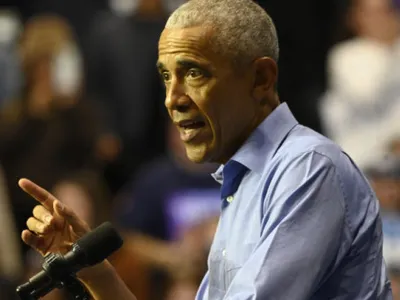Romania Rejected Communism. It Should Reject Communist 5G

Chinese 5G suppliers, like Lenovo, are weaponized by the CCP and should be banned.
In 1989, after decades of Soviet communist oppression, the Romanian people won their hard-earned freedom. Since then, Romania joined NATO, the European Union, and has become a good friend of the United States. We trust each other because we share the same principles underpinning our democracies, including respect for the rule of law, human rights, property and national sovereignty.
Citește și: România a respins comunismul. Ar trebui să respingă și 5G-ul comunist
The same cannot be said of the Chinese Communist Party (CCP) whose leader, General Secretary Xi Jinping, is a big fan of Russia’s President Vladimir Putin. They are ideological twins, both intent on dominating their democratic neighbors. The two even signed a mutual love letter on the eve of Putin’s invasion of Ukraine declaring their “friendship has no limits.”
There are also no limits to the CCP’s exploitation of Chinese companies to serve its malign interests. As Romanians know very well, there is no distinction between what’s public and what’s private in a communist system. Chinese companies like Lenovo, Huawei, ZTE, and others may appear like typical private businesses but they are, in fact, weapons of a Chinese communist regime that’s even more dangerous than the Soviet Union.
Citește și: Legea 5G, promulgată de președintele Klaus Iohannis
The Romanian government recognized the serious risk posed by Chinese companies to the country’s 5G network and banned them in 2021. The ban followed a 2019 U.S.-Romania memorandum of understanding aligning our countries on the threats posed by untrusted 5G vendors. The recent reversal of this policy, allowing Lenovo access to Romania’s 5G infrastructure, is hard to understand.
5G is not just about cell phones. It’s about power grids, sanitation, manufacturing, the Internet of Things (IoT), and much more. The CCP, a predatory regime that devours data on a massive scale, simply cannot be trusted to handle Romanians’ most private information, its businesses’ intellectual property, or the country’s national security. That’s why 60 nations, representing two-thirds of the world’s GDP, more than 200 telecommunications companies, and dozens of industry-leading giants joined the Clean Network Alliance of Democracies and excluded high-risk, Chinese 5G vendors from their networks.
They recognized them as tools of the Chinese surveillance state, and committed to only using trusted 5G equipment. The Clean Network included 27 of 30 NATO Allies, 26 of 27 EU members, 31 of 37 OECD and 11 of 12 Three Seas nations.
The European Commission issued its own EU 5G “Clean” Cybersecurity Toolbox restricting high-risk vendors – notably those from China – from participating in EU’s 5G communications. The Toolbox defined the criteria and outlined clear measures to avoid the use of high-risk suppliers in the network, including the Radio Access Network.
As U.S. Under Secretary of State, I joined the European Commissioner for Internal Market Thierry Breton in highlighting our commitment to shared principles on 5G security and the synergies between the EU 5G Cybersecurity Toolbox and the Clean Network – both rooted in internationally accepted digital trust standards. The 5G Toolbox continues to serve as a reference for telco operators’ board of directors, who are required to make the decision on 5G suppliers.
Commissioner Breton and I alerted all board members of European telecommunications companies that, according to the EU Toolbox, if they choose a high-risk 5G supplier and something happens to compromise the data, they may be liable for the damage. Romanian executives must be aware of their responsibilities as outlined by the European Commission.
Just recently, Thierry Breton reiterated the serious threat to the EU’s collective security from high-risk 5G equipment and called on all EU institutions to exclude Chinese equipment, citing China’s National Intelligence Law compelling every Chinese citizen and company to surrender all data to the Chinese government. Huawei, ZTE, Lenovo, and others have no choice in the matter.
In its statement approving Lenovo’s participation in Romania’s 5G network, the government said the company is governed by the laws of Hong Kong with an “independent judiciary.” That may have been true before June 30, 2020, when the Chinese government used its National Security Law to crush Hong Kong’s freedom, but no longer.
The United States no longer views Hong Kong as autonomous. We treat it like mainland China because Beijing is now in charge. In a recent open letter, 31 U.S. Senators from both political parties noted, “The Chinese Communist Party (CCP) and its acolytes in the Hong Kong government…have arrested pro-democracy activists, prosecuted hundreds of political prisoners, obliterated a legislature chosen by the Hong Kong people, and pressured Hong Kong’s judicial system to align with Beijing’s political prerogatives.”
Other arguments rationalizing the inclusion of Chinese 5G equipment make a distinction between the 5G “edge” and the “core,” suggesting that deploying compromised equipment at the edge is tolerable whereas the core is more sensitive. Experts, however, understand that a secure edge is just as important as a secure core, because it’s all part of an integrated system.
And they know that talk of “secret back doors” is irrelevant because software updates provide a front door every day through which 5G vendors have the capability to pull data and interfere with networks.
The good news is there are trusted alternatives to Lenovo and other compromised Chinese vendors. Companies like Ericsson, Nokia, and Samsung offer world-class 5G service to fill Romania’s need for fast, reliable transmission of data.
Additionally, initiatives such as Open RAN show great promise in accelerating innovative, secure, and trusted solutions. The U.S. is collaborating with our partners in Europe and around the globe to further advance these trusted technologies.
Romanians rejected the Soviet brand of communism along with its invasive surveillance apparatus. You know better than to trust another communist regime with access to your most sensitive information and should reject Chinese 5G.
———
Keith Krach served as U.S. Under Secretary of State from 2019-21. He is currently the Chairman of the Krach Institute for Tech Diplomacy at Purdue and serves as co-chair of the Global Tech Security Commission.
Krach’s team built the Clean Network Alliance of Democracies, for which he was nominated for the 2022 Nobel Peace Prize.















